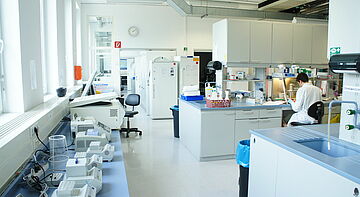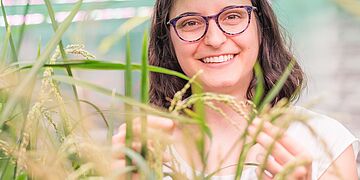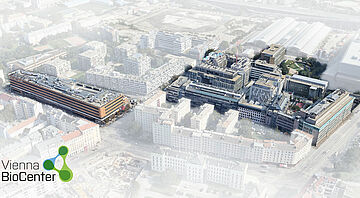
Microbiology and Environmental Systems Science
Microorganisms are the hidden power on our planet, but the least studied of all life forms. Research in Microbiology and Ecosystem Science aims to reveal structure-function relationships of microbial communities in environmental and medical systems and to reach a comprehensive understanding of host-microbe interactions. Research in this area is essential to understand the role of microbial communities for the functioning of complex ecosystems and their susceptibility to global change due to human activities.

Functional microbiome research is at the heart of this research area. The term microbiome describes particular communities of bacteria, archaea, eukaryotes and viruses associated with a specific environment. Research in this area includes different ecosystems such as soils, the open sea, coastal regions, sediments, fresh-and groundwater, extreme environments like deep-sea hydrothermal vents, and, last-but not least, the human body (e.g. gut microbiome). A special focus lies on symbioses and the evolution of mutualism and parasitism. An underlying topic in all those areas is how the actions of microbes influence these ecosystems, as well the health of humans and other organisms.

In microbial evolution, researchers aim at reconstructing the evolutionary history of genes and pathways and investigate how species and populations arise and change. This includes understanding how organisms adapt to each other such as how resistance to viruses evolves in microbes in the wild. We are also looking at evolution in deep time to get a better understanding about the very origins of our planet’s different life forms, for instance to find common ancestors between Eukaryotes and Archaea.

We explore the crucial role of environmental microbiomes for global biogeochemical cycles in terrestrial, aquatic and man-made ecosystems. Our research focuses on the structure and function of these microbiomes and the resulting flows of nutrient elements such as carbon (C), nitrogen (N), phosphorous and sulphur (S). One focus is illuminating the complex biology of the N and S cycles, from the level of processes in different ecosystems, to the involved microbial communities and the ecophysiology of single microbial species. We aim to contribute to a holistic picture of these cycles, which is indispensable for predicting and mitigating environmental threats caused by human activities. Soils play a pivotal role in the functioning of the Earth’s terrestrial ecosystems and harbor an almost unconceivable diverse microbiome.
Our research on the microbiology of soils addresses fundamental questions on the factors governing the extensive microbial diversity, on the function of microorganisms in their environment, their role in the terrestrial C cycling and on interactions amongst microorganisms and with plants and soil fauna.
The functional plasticity and diversity of microbes in the environment and the complexity of their interactions make the prediction of future effects of climate change on microbially-mediated ecosystem functions one of the most challenging frontiers of today’s ecology research. Researchers at VBC campus meet this challenge and explore microbial responses to climate change, e.g., by investigating how warming-induced changes in soil organic matter breakdown may lead to soil-climate feedbacks through altered greenhouse gas production.

Researchers covering these topics at the VBC campus apply a wide range of state-of-the art methods, starting with bioinformatic toolsfor comparative genomics, metagenomics and metatranscriptomics, proteomics and metabolomics, to microbial community modelling. The activities of microorganisms are investigated via isotopebiogeochemistry, probing light and heavy stable isotopes, as well as radiogenic and radioactive isotopes. These technologies that (amongst others) are used to quantify ecosystem processes are then paired with single-cell analyses to link microorganisms with function. Techniques used to detect metabolic activities at the single-cell level include Fluorescence in situ hybridization (FISH), NanoSIMS and Raman microspectroscopy, which are continually optimized and adapted to address new research questions.
Research Groups 'Microbiology and Environmental Systems Science'
| Research Group | Institute | Topic |
|---|---|---|
| Baltar Gonzalez | Uni Vienna - Faculty of Life Sciences | Biological Oceanography |
| Baltazar de Lima de Sousa | Uni Vienna - Faculty of Life Sciences | Archaea Genome Evolution and Ecology |
| Bright | Uni Vienna - Faculty of Life Sciences | Chemosynthesis in Marine Benthic Ecosystems |
| Bulgheresi | Uni Vienna - Faculty of Life Sciences | Environmental cell biology |
| Griebler | Uni Vienna - Faculty of Life Sciences | Groundwater Ecosystems |
| Herndl | Uni Vienna - Faculty of Life Sciences | Marine Microbial and Molecular Ecology |
| Ibl | Uni Vienna - Faculty of Life Sciences | Cell Biology in Crop Seeds |
| Keckeis | Uni Vienna - Faculty of Life Sciences | Fish Ecology in Rivers |
| Lang | Uni Vienna - Faculty of Life Sciences | Structural and Functional Plant Cell Biology |
| Revilla-i-Domingo | Uni Vienna - Faculty of Life Sciences | Early Animal Evolution, Stem Cell Differentiation & Deep-Sea Sponge Ecology |
| Rittmann | Uni Vienna - Faculty of Life Sciences | Archaea Physiology & Biotechnology |
| Schagerl | Uni Vienna - Faculty of Life Sciences | Functional Ecology of Microalgae |
| Schleper | Uni Vienna - Faculty of Life Sciences | Archaea Ecology and Evolution |
| Waldherr | Uni Vienna - Faculty of Life Sciences | Computational Methods for Bio-/Chemical Processes |
| Weckwerth | Uni Vienna - Faculty of Life Sciences | Systems Theory in Ecology and Biology |
| Wienkoop | Uni Vienna - Faculty of Life Sciences | Plant-Microsymbiont Interaction |
| Berry | Uni Vienna - CeMESS | Human Microbiome & Intestinal Microbiota in Health and Disease |
| Boettcher | Uni Vienna - CeMESS | Chemistry of Microbial Interactions & Microbe-Phage Interactions & Secondary Metabolites & Antibiotics |
| Daims | Uni Vienna - CeMESS | Microbial Ecophysiology in the Biogeochemical Nitrogen and Other Element Cycles |
| Horn | Uni Vienna - CeMESS | Microbial Symbioses |
| Kaiser | Uni Vienna - CeMESS | Soil Microbial Ecology & Complexity and Plant-Soil Interactions |
| Loy | Uni Vienna - CeMESS | Symbiotic Microbiota of Animals and Humans & Evolution and Ecology of Sulfur Microorganisms |
| Petersen | Uni Vienna - CeMESS | Ecology and Evolution of Host-Microbe Symbioses |
| Polz | Uni Vienna - CeMESS | Microbial Population Genomics & Microbial Viruses & Evolutionary Ecology & Microbiomes |
| Rattei | Uni Vienna - CeMESS | Computational and Systems Biology & Genome and Metagenome Analysis & HPC |
| Richter | Uni Vienna - CeMESS | Growth and Carbon Use Efficiency & Climate Change Ecology & Soil Microbial Ecology |
| Wagner I | Uni Vienna - CeMESS | Cognitive Neuroscience of Neural Plasticity & Memory & Brain-Microbiome Interactions |
| Wagner M | Uni Vienna - CeMESS | Nitrification & Single Cell Microbiology & Sponge and Wastewater Microbiomes |
| Wanek | Uni Vienna - CeMESS | Biogeochemical Cycling in Plant-Soil-Microbe Systems |
| Willemsen | Uni Vienna - CeMESS | Genomic evolution of giant viruses |
| Woebken | Uni Vienna - CeMESS | Survival Mechanisms of Soil Microorganisms & Plant-Microbe Interactions |



